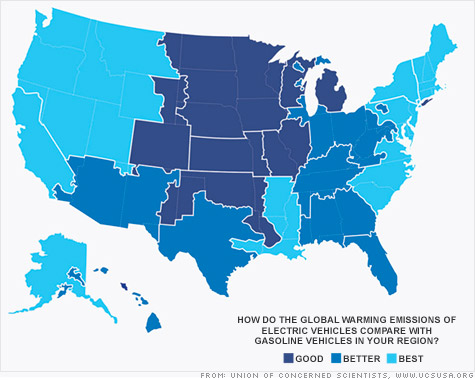Search News

This map from the Union of Concerned Scientists shows how the emissions generated by electric vehicles compared with their gas-powered counterparts vary across the country.
NEW YORK (CNNMoney) -- When it comes to choosing an environmentally friendly car, where you live may be as important as what you drive.
That's the message of a new report from the environmental advocacy group Climate Central, which tracks the carbon emissions generated by electric cars, hybrids and traditional vehicles in different states. The results vary, it turns out, depending on how those states produce their electricity.
In places like Wyoming and West Virginia, the vast majority of electricity comes from emission-heavy coal. As a result, the charging necessary for the all-electric Nissan Leaf leaves the car generating more greenhouse gas emissions per mile in these places than fuel-efficient gas-powered cars like the Ford (F, Fortune 500) Focus or the Honda Fit.
In Indiana, where 90% of the state's electricity comes from coal, charging the Leaf generates nearly twice the greenhouse gas emissions per mile as the Toyota Prius, a hybrid that uses gasoline to charge its batteries. The Prius produces fewer emissions per mile than the Leaf in 36 states, the report says.
In states like Washington and Vermont, it's a different picture. Because these states get most of their electricity through technologies like hydro- and nuclear power that generate fewer emissions, all-electric vehicles are the most climate-friendly choice.
The report offers similar findings to a study released earlier this month by another advocacy group, the Union of Concerned Scientists. That study broke the U.S. down into 26 "grid regions" depending on their primary electricity sources.
Roughly 45% of Americans live in regions where electric vehicles produce fewer emissions than even the most fuel-efficient gasoline hybrids on the market, according to the UCS report.
Regardless of where one lives, the reports emphasize, electric cars are a more climate-friendly choice than most vehicles on the market, and will generate fewer emissions in the future as states modernize their electrical grids.
"Even in the worst cases, in the regions where the electrical grid is heavily dependent on coal, an electric vehicle is a good choice compared with the some of the most efficient non-hybrid models out there," said Don Anair, a senior engineer with the Union of Concerned Scientists.
Electric vehicles are typically more expensive than traditional gas-powered and hybrid vehicles. They have the added benefits, however, of saving drivers money on fuel costs over the lifespan of the vehicle and helping the U.S. reduce its dependence on foreign oil.
"They're a good choice today, and as we clean up our electricity grid, they'll become even cleaner," Anair said. ![]()